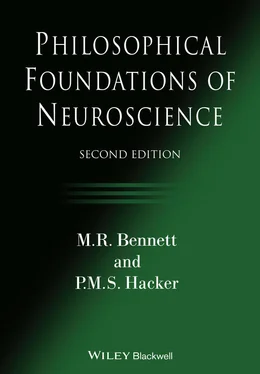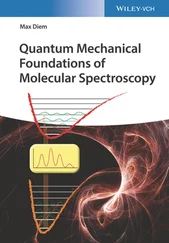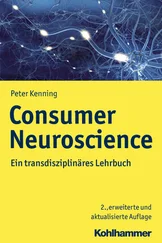3.3 Qualms Concerning Ascription of a Mereological Fallacy to Neuroscience
Methodological objections to the accusation that neuroscientists are guilty of a mereological fallacy
If a person ascribes a predicate to an item to which the predicate in question logically could not apply, and this is pointed out to him, then it is only to be expected that he will indignantly insist that he didn’ t ‘mean it like that’. After all, he may say, since a nonsense is a form of words that says nothing, that fails to describe a possible state of affairs, he obviously did not mean a nonsense – one cannot mean a nonsense, since there is nothing, as it were, to mean. So his words must not be taken to have their ordinary meaning. The problematic expressions were perhaps used in a special sense, and are really merely homonyms; or they were analogical extensions of the customary use, as is indeed common in science; or they were used in a metaphorical or figurative sense. If these escape routes are available, then the accusation that neuroscientists fall victim to a mereological fallacy may be unwarranted. Although they make use of the same psychological vocabulary as the man in the street, they are using it in a different way. So objections to neuroscientists’ usage based upon the ordinary use of these expressions are irrelevant.
Things are not that straightforward, however. Of course, the person who misascribes a predicate in the manner in question does not intend to utter a form of words that lacks sense. But that he did not mean to utter a nonsense does not ensure that he did not do so. Although he will naturally insist that he ‘didn’ t mean it like that’, that the predicate in question was not being used in its customary sense, his insistence is not the final authority. The final authority in the matter is his own reasoning . We must look at the consequences he draws from his own words – and it is his inferences that will show whether he was using the predicate in a new sense or misusing it. If he is to be condemned , it must be out of his own mouth . So, let us glance at the proposed escape routes that are intended to demonstrate that neuroscientists and cognitive scientists are not guilty of the errors of which we have accused them. 18
First objection (Ullman): the psychological predicates thus used are homonyms of ordinary psychological predicates, and have a different, technical, meaning
First, it might be suggested that neuroscientists are in effect employing homonyms, which mean something altogether different. There is nothing unusual, let alone amiss, in scientists introducing a new way of talking under the pressure of a new theory. If this is confusing to benighted readers, the confusion can easily be resolved. Of course, brains do not literally think, believe, infer, interpret or hypothesize, they think*, believe*, infer*, interpret* or hypothesize*. They do not have or construct symbolic representations, but symbolic representations*. 19
Second objection (Gregory): the psychological predicates thus used are analogical extensions of the ordinary expressions
Second, it might be suggested that neuroscientists are extending the ordinary use of the relevant vocabulary by analogy, as has often been done in the history of science – for example, in the analogical extension of hydrodynamics in the theory of electricity. So, to object to the ascription of psychological predicates to the brain on the grounds that in ordinary parlance such predicates are applicable only to the animal as a whole would be to display a form of semantic inertia . 20
Third objection (Blakemore): neuroscientists’ ascription of psychological attributes to the brain is figurative or metaphorical, since they know perfectly well that the brain does not think or use maps
Finally, it might be argued that neuroscientists do not really think that the brain reasons, argues, asks and answers questions just as we do. They do not really believe that the brain interprets clues, makes guesses or contains symbols which describe the outside world. And although they talk of there being ‘maps’ in the brain and of the brain’ s containing ‘internal representations’, they are not using these words in their common or vulgar sense. This is figurative and metaphorical speech – sometimes even poetic licence. 21Neuroscientists, therefore, are not in the least misled by such ways of speaking –– they know perfectly well what they mean, but lack the words to say it save metaphorically or figuratively.
Fourth objection (Searle):the brain is not a part of a person, so ascribing psychological attributes to the brain is not a mereological fallacy at all
At the American Philosophical Association meeting (APA) in New York 2005 in an authors and critics session, John Searle argued that what we deem to be a mereological fallacy (of ascribing psychological attributes to part of a person) is in fact no such thing, because the brain is not a part of a person, but rather a part of a person’ s body. 22This is a red herring, since Aristotle, George Henry Lewes and Wittgenstein, whom we are explicitly following, did not invoke the category of person when they advanced their views on attributability (see above p. 82, especially footnote 13). It is true that we often switched from talk of human beings to talk of persons, and it can indeed be misleading. In this second edition we have minimized talk of persons in order to minimize misunderstanding, although, as we shall show, nothing turns on the matter when it comes to neuroscientists’ misascription of psychological properties to the brain.
Fifth objection (Dennett): the distinction that we present is no more than the distinction between mechanical and non-mechanical properties
At the same APA meeting, Daniel Dennett suggested that what we characterized as a mereological fallacy is in fact no more than a distinction (which he drew in 1969) between personal and sub-personal levels of explanation. 23According to Dennett being in pain is not a property of the brain, for pains are ‘mental phenomena’ that are ‘non-mechanical’, whereas cerebral processes are ‘essentially mechanical’. However, as we shall see, this is both misguided and misdirected.
3.4 Replies to Objections
Reply to Ullman’s objection that neuroscientists are using the psychological vocabulary in a special technical sense
With regard to the misuse of the psychological vocabulary involved in ascribing psychological predicates to the brain, all the evidence points to the fact that neuroscientists are not using these terms in a special sense. Far from being new homonyms, the psychological expressions they use are being invoked in their customary sense, otherwise the neuroscientists would not draw the inferences from them which they do draw. When Crick asserts that ‘what you see is not what is really there; it is what your brain believes is there’, it is important that he takes ‘believes’ to have its normal connotations – that it does not mean the same as some novel term ‘believes*’. For it is part of Crick’ s tale that the belief is the outcome of an interpretation based on previous experience and information (and not the outcome of an interpretation* based on previous experience* and information*). When Semir Zeki remarks that the acquisition of knowledge is a ‘primordial function of the brain’, 24he means knowledge, not knowledge* – otherwise he would not think that it is the task of future neuroscience to solve the problems of epistemology (but only, presumably, of epistemology*). Similarly, when Young talks of the brain’ s containing knowledge and information, which is encoded in the brain ‘just as knowledge can be recorded in books or computers’, 25he means knowledge, not knowledge* – since it is knowledge and information, not knowledge* and information*, that can be recorded in books and computers. When Milner, Squire and Kandel talk of ‘declarative memory’, they explain that this phrase signifies ‘what is ordinarily meant by the term “memory”’, 26but then go on to declare that such memories, not memories*, are ‘stored in the brain’. That presupposes that it makes sense to speak of storing memories (in the ordinary sense of the word) in the brain (for detailed discussion of this questionable claim, see §6.2.2 below).
Читать дальше












